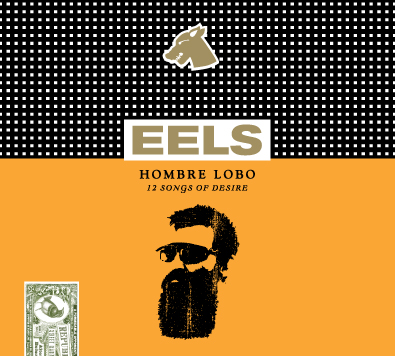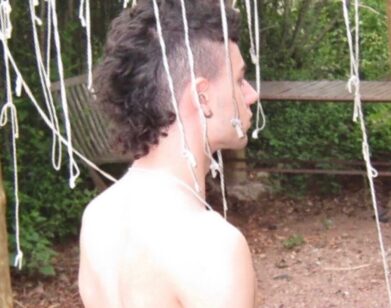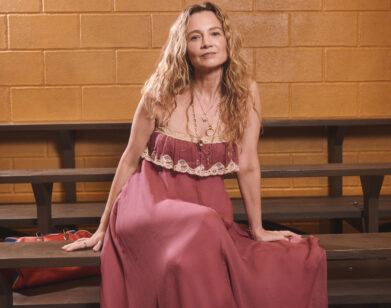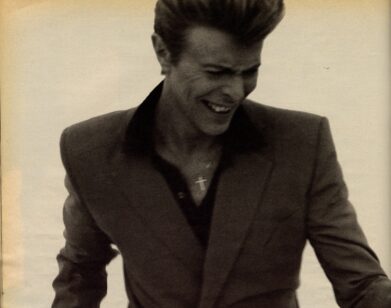Eels: He’s Electric

Photo by Autumn de Wilde
Mark Oliver Everett, better known as E, has recorded under the name Eels for the last 15 years, during which time he’s endured a variety of band mates, labels, and personal tragedies. He remains the one constant in his career—although he’s grown an enormous beard of late. His new album, Hombre Lobo (E Works Records), is a stripped down record that moves at a brisk clip, with gritty vocals and elemental guitars. On the opening track, “Prizefighter,” E declares: “I’m a dynamiter, I’m a prizefighter.” In “Fresh Blood,” E practically howls over very big drumbeats. We spoke over a tequila in a Midtown hotel, after he taped a performance for David Letterman, and discussed Indie music and its discontents, and the benefits of keeping a studio in your basement.
DAVID COGGINS: What’s it like playing David Letterman? Do you like that sort of thing where all of a sudden the lights are on?
E: It’s nerve-racking because we’re not on tour right now. Usually when you do shows you’re in the middle of the tour and you’re all oiled up and it’s just another stop. It’s so much pressure for just three minutes. My stomach still hurts.
DC: You played with at least ten different people have over the course of all the Eels’ records.
E: At least, probably more—20 or 25.
DC: What’s it like when you’re the only consistent element throughout all these records? And how do you start with new people and build chemistry?
E: For me the idea was always throw myself into different situations and push your imagination as far as you can to get to where you want to get to. I think a lot of bands make the same record over and over again because they’re married to the same three or four people. At some point they’ve done all they can do with their own imaginations.
DC: When you record with someone does that mean they’ll tour with you, or do you reevaluate the band when you tour because they have to learn all the old songs, right?
E: It’s a combination of who’s right and who’s free at the time. The people who make the album aren’t always the same people. I don’t want the tour to be just like the album—I like to think of the tour as another album.
DC: Do you like touring?
E: Well, it’s probably what a lot of people say: “The shows are fun but the rest of it is not so fun.”
DC: Do you mean being in the bus and being away from home?
E: Yeah, I’m a homebody. I like being at home. Ironically, I like routine, although I don’t like it artistically. But I need it routine so I can fly all over the place as a musician.
DC: What about the new record, which has quite a different sound?
E: The last Eels album, Blinking Lights, came out four years ago. It was a double album with all this sweeping orchestration and it’s only natural after doing something like that that you would want to do something more stripped down and immediate, something more succinct. The idea of desire appealed to me, something about playing guitar in a garage that’s different than sitting down with someone orchestrating at a computer. It’s just rocking. Which is something that’s lacking in so-called indie rock these days: elements of sex and danger. Let’s go chase some girls, let’s have some fun.
DC: Because Indie rock can be so knowing and self-referential?
E: There’s an element of earnestness that’s gone too far. I’m certainly part of that to some degree. Some of it makes it you wince a little bit.
DC: How long have you lived in Los Angeles and does being out there affect your music in any way?
E: I left Virginia for LA in the late 1980s. I don’t think being in LA affects me very much-except that I gave my album a Spanish name. You could pick up my house and put it in any city and the music would be the same.
DC: You recorded your album in a studio in your basement, right?
E: That’s right. There will be weeks when, aside from walking the dog, I don’t leave the house. I rarely drive anywhere.
DC: Is that the key to happiness in Los Angeles?
E: I got lucky I live in a neighborhood where I don’t have to drive.
DC: You wrote a book, Things The Grandchildren Should Know. What’s it like going from writing a book and then going back to writing music?
E: I like making something, putting it out is very hard. I find it very unpleasant. One of my ideas is making records and not putting them out. I really enjoy making them, but after the day you finish it it’s a world of pain for months.
DC: Do you mean talking to the press and touring?
E: That’s part of it, but it’s more than that. Throwing it out into the world makes you feel vulnerable. I felt like I painted myself into a corner after I made Blinking Lights (2005). It was the type of record you make at the end of your life. Maybe it’s okay to make this double record and maybe it’s okay to write my autobiography even though I’m only 40. It was good because I needed to create some space and come back in a few years. I got lucky because I was busy with this documentary about my father, and writing the book. Then I could come back and write music.
DC: What’s it like when you go back over all your albums when they’ve got such different sounds? Do you think, “I wouldn’t necessarily do that now but it made sense at the time?”
E: That’s exactly it. Whatever I’m into and doing I become so focused on that I just do it. Then I finish it and forget about it and go onto the next thing.
DC: How does your record company feel about that?
E: I learned a lesson on the first Eels record. It was a pretty big commercial success for us: We had a video on MTV and we were flying around all the time, and a lot of people were buying our records. But I really hated the whole experience. It showed me that I didn’t want to be a part of that world. Beginning with the album after that, Electro-Shock Blues, that was a little crazy idea at the time-a lot of the songs were about tragedy and depression. Everybody who worked with me advised me against it. Now I feel like I’m a success just because I’m still around.
DC: How do you navigate the era of the download when you like to make album with themes?
E: I miss albums, real vinyl. I love part one and part two and the break in between. I like to have some thread and think of what I make as an album. That’s old fashioned now. But I’m sticking to my guns.






